新概念英语第一册第67课
新概念英语第一册第67课

目录 Contents
• Overview of Text Content • Vocabulary and expression • grammar point • text analysis • Practice and activities
。例如:“I like apples,
but
my
friend
doesn’t.”
复合句
包含一个主句和一个或多 个从句的句子。例如:“I like apples, which are healthy for me.”
Tenses and Voices
时态
描述动作发生的时间,如现在、 过去或未来。例如:现在进行时 “I am eating an apple.”
语态
描述动作与主语的关系,如主动 或被动。例如:被动语态“The apple is being eaten by me.”
Grammar application
名词
用来表示人、事物或抽象 概念的词。例如: “apple”、“person” 、“happiness”。
动词
描述动作或状态的词。例 如:“run”、“eat”、 “be”。
VS
Activity 2
Have a small group discussion about a topic related to the lesson. Each person should contribute their ideas and listen to others, practicing active listening and turn-taking.
新概念第1册67课课文

新概念第1册67课课文全文共四篇示例,供读者参考第一篇示例:新概念英语是一部被广泛应用于英语教学领域的教材,其第1册的67课是其中的一篇课文。
本文将对这篇课文进行详细解读,帮助学生更好地理解和掌握其中的英语知识。
让我们来看一下这篇课文的内容。
这篇课文主要讲述了一个关于悲伤和幸福的故事。
故事的主人公是一个中年男子,他经历了一系列的挫折和困难后,终于走出了阴霾,重新找回了生活的乐趣和希望。
故事通过描述主人公的心路历程,展现了人生中的起起落落和挣扎,同时也传达了一种积极向上的生活态度。
课文以一种简洁明了的语言展现了主人公的内心世界和情感变化。
作者用生动的描写和细腻的情感抒发,让读者更容易产生共鸣和共情。
整个故事情节结构清晰,逻辑严谨,给人以深刻的启迪和思考。
在这篇课文中,我们可以学到很多有关英语语法和词汇的知识。
我们可以学习到一些常用的动词短语和句型结构,以及一些常见的形容词和副词用法。
通过阅读和理解这篇课文,我们可以提高我们的阅读理解能力,扩展我们的词汇量,提高我们的英语表达能力。
这篇课文还提供了一些关于人生哲理和情感体验的启示。
通过阅读这篇课文,我们可以更好地理解人生的意义和价值,感受到生活的无限可能性,坚定自己的信念和决心。
这样,我们不仅可以在英语学习中取得更好的成绩,还可以在日常生活中更加从容自信地面对挑战和困难。
这篇课文是一篇很有启发性和教育意义的文章,它不仅可以帮助我们提高英语水平,还可以在精神层面给予我们积极的激励和启示。
希望大家在阅读这篇课文的过程中能够有所收获,不断提升自己的英语能力和人生素养,成为更好的自己。
【文章2000字完】.第二篇示例:第一册第67课的课文是一篇有关自然景观的描述。
在这篇文章中,作者通过描绘蜿蜒而流的小溪、青翠的草地和远处的山丘,展现了大自然的宁静和美丽。
文章用简洁清晰的语言,让读者仿佛身临其境,感受到了大自然的魅力。
小溪似乎是这个美丽景观的灵魂,它曲曲折折地流过青翠的草地,清澈见底,仿佛一条银色的丝带在大地上舞动。
新概念英语第一册第67课

• Yes, he did. No, he didn't.
• What did he do this morning?
12
一般过去时的疑问句: Did +主语+谓语动词+其它
他今天早上看上去身体很好。
•He looked very well this morning. •Did he look very well this morning? •他今天早上洗盘子了。 •He washed the plates this morning.
他们在1990年是老师。
They were teachers in 1990. They weren't teachers in 1990. Were they teachers in 1990? Yes, they were. No, they weren't. What were they in 1990? What did they do in 1990? What were their jobs in 1990? 问职业……
16 16
一般过去时的否定
They were in the garden on Sunday.
They were not in the garden on Sunday. He was absent from school on Monday. He was not absent from school on Monday.
20
greengrocer
• • • •
n. 蔬菜水果零售商
她们昨天在在蔬菜水果店了吗? Were they at the greengrocer ’s yesterday ? 那个蔬菜水果店在哪儿? Where is that greengrocer’s?
新概念英语67课讲义资料讲解
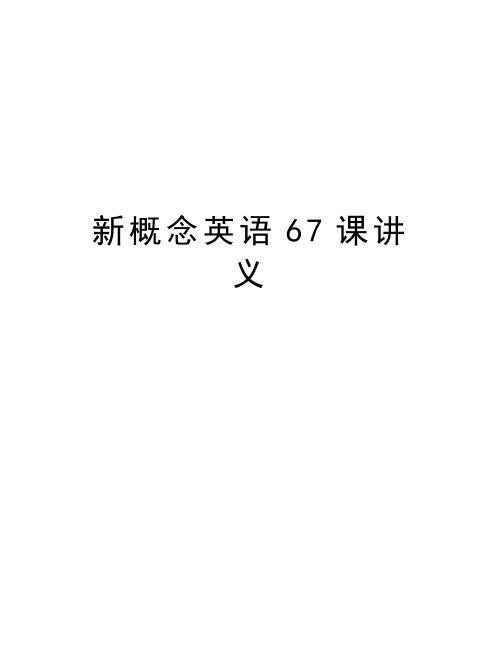
新概念英语67课讲义Lesson 67 the weekend 周末一、单词与短语greengrocer: n.蔬菜水果零售商;absent:adj.缺席的,重要短语:be absent from:缺席、、、、He was absent from school last week.上周他没上学。
keep: v.(身体健康)处于(状况),保持、、、keep doing sth:一直做、、、或者是不停地做、、、、;keep knocking the door:一直敲门;spend:v.度过;spend a weekend:度周末;weekend:v.周末;country:n.国家;乡村;lucky: adj.幸运的;luck:n.幸运,机遇。
Monday:n,星期一;Tuesday:n.星期二;Wednesday:n.星期三;Thursday:n.星期四;Friday: n.星期五;Saturday: n.星期六;Sunday: n.星期日;在星期几前边一般加介词on,如:on Monday:在周一;On Sunday:在周日;二、短语、句型与语法1、Were you at the butcher′s?刚才您在肉店里吗?Yes, I was. 是的,我在。
在本句中,需要注意的一个知识点:在英文表示某一种商店的短语中,shop这个词往往可以省略,如文中的the butcher′s 其实就是the butcher′s shop的省略,另外像文中的the greengrocer′s 其实就是 the greengrocer′s shop 的省略,另外的例子还有the hairdresse r′s (shop )等等,shop 的省略不影响句义,就是一种表达的习惯。
2、how is jimmy today?吉米今天怎么样?在本句中我们继续复习关于询问人或事物状况的几个重要的句型:How is/are+主语、、、怎么样?例:How are you today?你今天可好?How is Tom today?汤姆今天可好?另外What is the matter with、、、?经常用来询问人和事物的状况,常作“是否有问题”“是否有麻烦讲”例如:What is the matter with Tom?汤姆怎么了啊?What is the matter with this bike?这辆自行车怎么了啊?What is the matter with the book?这本书怎么了?3、Was he absent from school last week?上周他没上学吧?在本句中需要掌握一个重点短语的用法:be absent from:缺席、、、例:He is absent from the meeting since he is ill.他今天缺席会议是因为他病了。
新概念英语第一册第67-68课课件(共41张PPT)
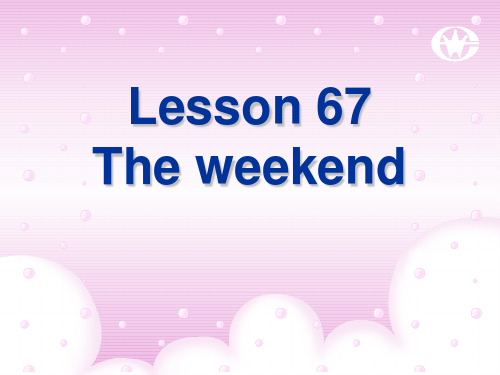
Aren't you lucky! ✲ 这句话是否定疑问句形式的感叹句,为的是加强语气。 尽管形式上是否定的,但却表示强有力的肯定。
Grammar
语法
一般过去时(simple past tense) :
过去发生的而现在已经结束的动作要用一般过去时。
基本用法:
1、常用来表示过去某一时间所发生的非持续性动作;
Lesson 67 The weekend
Discussion
What did you do on weekend ?
New Words
greengrocer 蔬菜水果零售商
absent
缺席的
keep
处于、保持
spend
度过
weekend 周末
country
乡村、国家
lucky
幸运的
New Words
5、We played(play的过去式) computer games together. 我们在一起玩了电脑游戏。
6、It ran(run的过去式) after a cat yesterday. 它昨天跑着追赶一只猫。
7、They made(make的过去式) a bookcase for Jim. 他们为Jim做了一个书架。
⑥Miss Zhang was ill 2 days ago. 张小姐前两天病了。
Miss Zhang wasn’t ill 2 days ago. 张小姐前两天没有生病。
一般过去时的句型构成形式:
一、含有系动词(be动词——am/is/are)的一般过去时形式:
✿疑问句: Was /Were + 主语 + …?
新概念Lesson-67-----The-weekend上课讲义

参加晚会。 反义词:present 出席,参加 Every employee must be present at the
meeting.每一位员工必须出席这个会议。
星期的表达
Monday Tuesday Wednesday Thursday Friday Saturday Sunday
weekday n. 平日(常指周一到周五的日子)
eg. My father is always busy in weekdays. 我爸爸平日总是很忙。
country
n. 乡村
country 1) n. 乡村,乡下 注意:country 当 “乡村,乡下”讲的时候,
前面必须用定冠词“the”;也可以说the countryside。
夫妇俩)
Now listen!
MRS.JOHNSON: Hello. Were you at the butcher’s?
MRS.WILLIAMS: Yes. I was. Were you at butcher’s, too?
MRS.JOHNSON: No, I wasn’t. I was at the greengrocer's. How's Jimmy today?
新概念英语 第一册
Hello! Everyone! I am Shannon.
Lesson 67 Tre you going to do at the weekend?
New Words and expressions 生词和短语
greengrocer absent Monday Tuesday Wednesday Thursday Keep
新概念英语第一册第67-68课-The weekend

新概念英语第一册第67-68课:The weekendLesson 67 The weekend周末Listen to the tape then answer this question.What are the Johnsons going to do at the weekend?听录音,然后回答问题。
约翰逊夫妇周末准备做什么?MRS JOHNSON: Hullo, Mrs Williams. Were you at the butcher's?约翰逊夫人:您好。
刚才您在肉店里吗?MRS WILLIAMS: Yes. I was. Were you at the butcher’s ,too?威廉斯夫人:是的,我在肉店里。
您也在肉店里吗?MRS JOHNSON: No, I wasn’t. I was at the greengrocer’s. How’s Jimmy today?约翰逊夫人:不,我不是。
我在蔬菜水果店里。
吉米今天怎么样?MRS WILLIAMS: He’s very well, thank you.威廉斯夫人:他很好,谢谢您。
MRS JOHNSON: Was he absent from school last week?约翰逊夫人:上星期他没上学吧?MRS WILLIAMS: Yes, he was. He was absent on Monday, Tuesday, Wednesday and Thursday.How are you all keeping?威廉斯夫人:是的,他没上学。
他星期一、星期二、星期三和星期四没去上学。
你们身体都好吗?MRS JOHNSON: Very well, thank you. We’re going to spend three daysin the country. We’regoing to stay at my mother’s for the week-end.约翰逊夫人:很好,谢谢您。
新概念英语第一册 第67课NCE1 lesson67 Gavin

absent
/ˈ æ bsənt/ adj. 缺席的
反义词: present [ˈ preznt] adj. 出席的 All of the students will be present at the meeting. 全体学生将出席会议。
Gavin交流YY群:9293585
单词讲解
Lesson 67
约翰逊夫人:您好。刚才您在肉店里 吗? 威廉斯夫人:是的,我在肉店里。 您也在肉店里吗? 约翰逊夫人:不, 我不是。 我在蔬菜水果店里。
Lesson 67
Gavin交流YY群:9293585
课文讲解
Lesson 67
本课语法:一般过去时态(be动词的过去式变化) 一、含义
在英语中,非现在的以前都叫过去。 过去发生的而现在已经结束的动作要用一般过去时态。 一般过去时表示过去某个时间里发生的动作或状态或过去习惯性、 经常性的动作行为。
Gavin交流YY群:9293585
课文讲解
Lesson 67 The weekend 周末 A: Hello. Were you at the butcher's? B: Yes. I was. Were you at the butcher's, too? A: No, I wasn't. I was at the greengrocer's.
Gavin交流YY群:9293585
课文讲解
Lesson 67
三、用法 一般过去时常表示在 过去某一个特定的时间发生的动作或 存在的状态,此时常和表示过去的特定的时间状语连用。 这些时间状语有:yesterday, yesterday evening, last night, last year, last summer等。 句子转换成现在时的对比: Were you at the butcher's? —— Are you at the butcher's? Yes, I was. —— Yes, I am. No, I wasn't. —— No, I'm not. 要记得第一、第三人称单数都用was;其他情况则用were.
新概念英语第一册lesson67Theweekend

周末的重要性
放松身心:周末是放松身心的好时机,可以缓解工作压力和疲劳 家庭时光:周末是与家人共度时光的好机会,可以增进亲情和家庭关系 个人兴趣:周末可以用来追求个人兴趣和爱好,提升自己的技能和知识水平 社交活动:周末可以参加各种社交活动,结交新朋友,拓展人际关系
听录音模仿发 音和语调
练习听力和口 语表达
学习资源推荐
教材:新概念英语第一册lesson67Theweekend 视频教程:B站上有相关的教学视频,可以跟着老师学习 学习软件:扇贝单词、百词斩等APP上有新概念英语的单词和课文,可以随时随地学习 学习网站:新东方在线、沪江网校等网站上有新概念英语的教学课程,可以系统地学习
旅游观光:利用周末时间游览景点,了解当地文化,增强跨文化交流能力。
周末活动的实践案例分享
周末英语角:参加英语角活动,与母语人士交流,提高口语水平 英文电影赏析:观看适合英语初学者的英文电影,提高听力和语感 英语歌曲学习:学习简单的英文歌曲,培养英语学习兴趣 英语阅读:阅读适合英语初学者的英文故事或短篇小说,提高阅读能力
课文中的重点词汇和表达
重点词汇:周 末、公园、散 步、早晨、晚 上、享受、音 乐会、演奏、
钢琴、独奏
重点表达:在 公园散步,度 过一个愉快的 早晨和晚上; 参加音乐会, 欣赏演奏;形 容音乐会的气
氛和感受。
课文中的语法点
情态动词:本 课介绍了情态 动词"can"的用 法,表示能力
或可能性。
现在进行时: 课文中使用了 现在进行时, 表示正在进行 的动作或状态。
周末活动的种类
休闲娱乐活动: 看电影、听音乐、 玩游戏等
新概念英语第一册第67-68课-The weekend
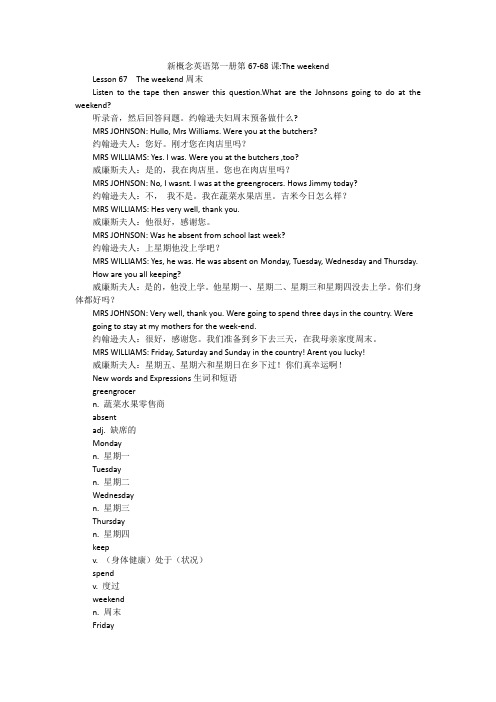
新概念英语第一册第67-68课:The weekendLesson 67 The weekend周末Listen to the tape then answer this question.What are the Johnsons going to do at the weekend?听录音,然后回答问题。
约翰逊夫妇周末预备做什么?MRS JOHNSON: Hullo, Mrs Williams. Were you at the butchers?约翰逊夫人:您好。
刚才您在肉店里吗?MRS WILLIAMS: Yes. I was. Were you at the butchers ,too?威廉斯夫人:是的,我在肉店里。
您也在肉店里吗?MRS JOHNSON: No, I wasnt. I was at the greengrocers. Hows Jimmy today?约翰逊夫人:不,我不是。
我在蔬菜水果店里。
吉米今日怎么样?MRS WILLIAMS: Hes very well, thank you.威廉斯夫人:他很好,感谢您。
MRS JOHNSON: Was he absent from school last week?约翰逊夫人:上星期他没上学吧?MRS WILLIAMS: Yes, he was. He was absent on Monday, Tuesday, Wednesday and Thursday.How are you all keeping?威廉斯夫人:是的,他没上学。
他星期一、星期二、星期三和星期四没去上学。
你们身体都好吗?MRS JOHNSON: Very well, thank you. Were going to spend three days in the country. Were going to stay at my mothers for the week-end.约翰逊夫人:很好,感谢您。
新概念英语第一册第67课(2)

3月19日新概念英语第一册67课Lessen 67--greengrocer n. 蔬菜水果零售商--at the greengrocer’s 在蔬菜水果店里--Where is your mother?--My mother is at the greengrocer’s.--absent adj. 缺席的--be absent from… 缺席,不参加--She is always absent from school. 她总是逃学。
--They are absent from the party. 他们没有参加这个晚会。
--反义词present--Every employee must be present at the meeting. 每一位员工都必须参加这个会议。
--Monday n. 星期一--keep v.1)保持(后面接复合宾语)--keep the room warm 保持房间温暖--keep the window open 让窗户开着2)保存,保留--Buy a pair of trousers with this money and you can keep the change. 用这钱买一条新裤子,剩下的零钱你可以拿去。
-- You can keep this book if you like it. 如果你喜欢,你可以保留这本书。
3)How are you keeping? = How are you?--是用来问候别人身体状况的话。
--spend v.1) 度过(一段时光)--I am going to spend two weeks in France. 我打算在法国度过两周。
2)花(时间)--I spent 3 hours on my English every day.--He spent too much time on sport.--spend some time (in) doing sth 花….时间做某事--He spends an hour (in) reading newspapers every day. 他每天用一个小时时间看报纸。
新概念英语第一册第67课课件NCE1Lesson67(共47页)

绕口令游戏 • 3. I scream, you scream, we all scream for ice-cream! • 我叫喊,你叫喊,我们都喊着要冰 淇淋!
绕口令游戏
• 4. Betty beat a bit of butter to make a better butter. 贝蒂敲打一小块黄油要做一 块更好的奶油面。
• Spend v.度过 • Spend+n./pron度过
翻译
• We are gonging to spend several days at my mother’s. • I want to spend my holiday in the country this weekend.
• I hope that you wouldn’t spend so much time watching television.
Part one
• Something like apples, bananas, pears….
Part one
• We eat it in summer, it make us cool down
Part one
• The place with lots of water
Part one
Part three
• Can you count? • 猜数字游戏
Part four
• 绕口令游戏
绕口令游戏
• 1. Can you can a can as a canner can can a can? 你 能够像罐头工人一样装罐头 吗?
绕口令游戏
• 2. I wish to wish the wish you wish to wish, but if you wish the wish the witch wishes, I won't wish the wish you wish to wish. • 我希望梦想着你梦想中的梦想,但是如果 你梦想着女巫的梦想,我就不想梦想着你 梦想中的梦想。
新概念英语第一册课文翻译及学习笔记Lesson67
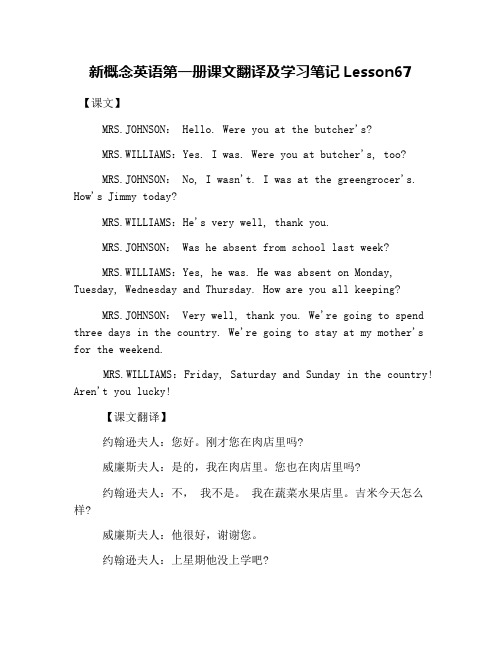
新概念英语第一册课文翻译及学习笔记Lesson67【课文】MRS.JOHNSON: Hello. Were you at the butcher's?MRS.WILLIAMS:Yes. I was. Were you at butcher's, too?MRS.JOHNSON: No, I wasn't. I was at the greengrocer's. How's Jimmy today?MRS.WILLIAMS:He's very well, thank you.MRS.JOHNSON: Was he absent from school last week?MRS.WILLIAMS:Yes, he was. He was absent on Monday, Tuesday, Wednesday and Thursday. How are you all keeping?MRS.JOHNSON: Very well, thank you. We're going to spend three days in the country. We're going to stay at my mother's for the weekend.MRS.WILLIAMS:Friday, Saturday and Sunday in the country! Aren't you lucky!【课文翻译】约翰逊夫人:您好。
刚才您在肉店里吗?威廉斯夫人:是的,我在肉店里。
您也在肉店里吗?约翰逊夫人:不,我不是。
我在蔬菜水果店里。
吉米今天怎么样?威廉斯夫人:他很好,谢谢您。
约翰逊夫人:上星期他没上学吧?威廉斯夫人:是的,他没上学。
他星期一、星期二、星期三和星期四没去上学。
你们身体都好吗?约翰逊夫人:很好,谢谢您。
我们打算到乡下去三天,在我母亲家度周末。
新概念英语第一册第67课演示教学

规则变化的动词过去式
1 直接加ed:
work—worked look—looked 2 以不发音e结尾的单词,直接加d:
live —lived use—used, 3 以辅音字母+y结尾的,变y为i加ed:
No, 主语+didn’t.
• 他今天早上做饭了。(肯、否、疑、答、特) • He cooked this morning. • He didn’t cook this morning. • He did not cook this morning. • Did he cook this morning? • Yes, he did. No, he didn't. • What did he do this morning?
15 15
一般过去时的否定
They were in the garden on Sunday. They were not in the garden on Sunday. He was absent from school on Monday. He was not absent from school on Monday.
13
一般过去时的否定
主语+did not/ didn’t+ 谓语+宾语 We didn’t cook this morning. He didn’t cook this morning. 对比一下: 一般现在时的否定: We don’t cook in the morning. He doesn’t cook in the morning.
11
新概念英语第一册Lesson67_72课文详注

新概念英语第一册Lesson67~72课文详注【导语】学习新概念英语并不难啊。
你还在为英语成绩低拖后腿而烦恼吗?不要着急,小编小编为大家提供了“新概念英语第一册Lesson67~72课文详注”。
相信加入学习当中的你,很快便不再受英语的困扰!还在等什么?和小编一起来学习吧!新概念英语第一册Lesson67~68课文详注1. Were you at the butcher's?刚才您在肉店里吗?at the butcher' s=at the butcher' s shop。
在英文中,表示店铺、住宅、公共机构、公共建筑物以及教堂的名字或某人家时,名词所有格后常不出现它所修饰的名词:the greengrocer' s ( shop)蔬菜水果店the hairdresser' s ( shop)理发店the stationer' s ( shop)文具店the doctor' s ( office)诊所my mother ' s ( house)我妈妈家里St . Paul ' s ( Church)圣保罗教堂2. be absent from 不在,缺席。
3. the country=the countryside 乡下。
country表示“农村”时,前面一定要加定冠词the。
新概念英语第一册Lesson69~70课文详注1.hundreds of 数以百计的。
这是用来表示不定数量的复数形式。
类似的结构还有thousands of(数以千计的),millions of(数以万计的)。
但必须注意:说five hundred(500 ) , six thousand(6000),two million(200万)等具体数字时,hundred, thousand,million这些词因为之前有具体数字而本身不加-s。
2. at the race 观看比赛。
新概念英语单词第一册第67课:周末
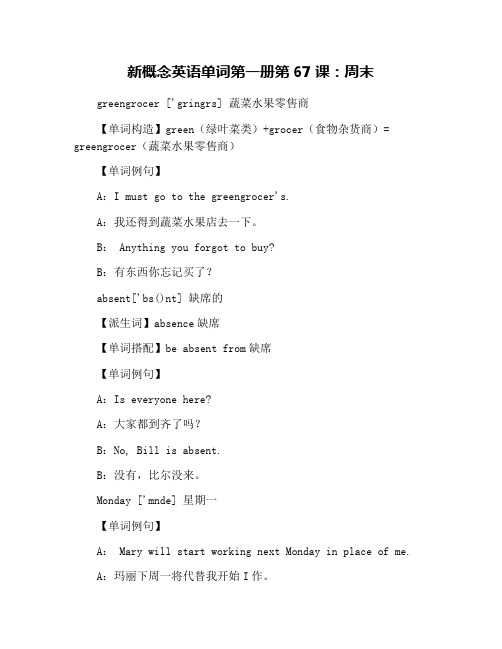
新概念英语单词第一册第67课:周末greengrocer ['gringrs] 蔬菜水果零售商【单词构造】green(绿叶菜类)+grocer(食物杂货商)= greengrocer(蔬菜水果零售商)【单词例句】A:I must go to the greengrocer's.A:我还得到蔬菜水果店去一下。
B: Anything you forgot to buy?B:有东西你忘记买了?absent['bs()nt] 缺席的【派生词】absence缺席【单词搭配】be absent from缺席【单词例句】A:Is everyone here?A:大家都到齐了吗?B:No, Bill is absent.B:没有,比尔没来。
Monday ['mnde] 星期一【单词例句】A: Mary will start working next Monday in place of me.A:玛丽下周一将代替我开始I作。
B: We'II miss the time we spent together.B:我们会怀念和你一起共事的时光。
Tuesday ['tjuzde; -d] n.星期:【单词例句】A: Any day except Tuesday would be converuent for me.A:除了周二外任何一天我都方便。
B: Good. Let's make it next Monday.B:太好了,我们就定在下周一吧。
Wednesday ['wenzde; -d] 星期三【单词例句】A: When shall we leave for Dalian?A:我们什么时候动身去大连?B: What would you say about next Wednesday?B:你看下星期三怎么样?Thursday ['θzde; -d] 星期四【单词例句】A:I won't be able to keep my appointment with you on Thursday.A:星期四我不能跟你约会了。
新概念英语第一册Lesson67_72语法及单词

新概念英语第一册Lesson67~72语法及单词新概念英语第一册Lesson67~68语法及单词语法Grammar in use一般过去时be( am/is/are)的过去式是was/were:在英文中,过去发生的而现在已经结束的动作要用一般过去时来表示。
be动词的过去式不规则,第1人称与第3人称单数用was,其他情况用were。
用be动词的一般现在时形式的一般疑问句及特殊疑问句迄今已介绍过,其过去时形式也一样,只是动词be在形式上变为was或were。
请看以下例句:Was Mrs.Johnson at the butcher’s?约翰逊夫人在肉店吗?No,sha wasn’t.她不在。
Were you at school or at church ou January 1st ?1月1号你在学校还是上教堂了?I wasn't at school on January 1 st .I was at church.我1月1号没上学。
我上教堂做礼拜了。
When was he absent from school ?他何时缺课了?He was absent on Monday,Tuesday,Wednesday and Thursday . 他周一、周二、周三和周四缺课了。
Where were you on Sunday ?周日你在哪儿?I was at church on Sunday.我周日在教堂做礼拜。
词汇学习Word study1. spend v.(1)花(时间等);度过:Where are the Johnsons going to spend the weekend ?约翰逊一家准备到哪儿去度这个周末?I hope that you wouldn’t spend so much time watching television.我希望你不要花这么多的时间看电视。
(2)用(钱),花费:I’m going to spend all my money this weekend !这个周末我要把我所有的钱都花掉!At present,more and more people have come to realize that more money should he spent on health and education.目前,越来越多的人已开始认识到:应该在健康和教育方面多花些钱。
新概念第一册第67--69课

25
He cooked this morning.
Did he cook this morning? He didn’t cook this morning.
He did not cook this morning.
26
Did he cook this morning? Did +主语+谓语动词+其它
17
现在进行时: (lesson 31) He is making the tea. He is not making the tea. Is he making the tea?
18
描述过去的事实或状态,描述过去的动作
1、表示过去某个点上特定的时间存在的状 态,事实,或发生的动作。 2、表示在过去的一段时间内经常发生的动 作或反复的习惯。
37
be absent from 不在,缺席 be absent from school 缺课 be absent from work 旷工
She doesn’t like school, so she is often absent from school. 她不喜欢上学,所以她经常缺课。
我刚才在蔬菜水果店里.
上星期他没上学吧? 是的,他没上学.
13
他周一,周二,周三,和周四都没去上学.
我们打算去乡下去三天, 在我母亲家度周末. 你们真幸运啊!
14
时态
一般
进行 现在进行时 过去进行时
完成
完成进行
现在 一般现在 时 过去 一般过去 时
- 1、下载文档前请自行甄别文档内容的完整性,平台不提供额外的编辑、内容补充、找答案等附加服务。
- 2、"仅部分预览"的文档,不可在线预览部分如存在完整性等问题,可反馈申请退款(可完整预览的文档不适用该条件!)。
- 3、如文档侵犯您的权益,请联系客服反馈,我们会尽快为您处理(人工客服工作时间:9:00-18:30)。
• I spent 10 yuan on the book./(in) buying the book. • I didn't spend 10 yuan on the book./(in) buying the book. • Did you spend 10 yuan on the book./(in) buying the book? • Yes,I did. No, I didn't. • How much did you spend on the book./(in) buying the book?
我花了10元买那本书。
他花了一个小时打篮球。
• He spent an hour (in) playing basketball. • He didn't spend an hour (in) playing basketball. • Did he spend an hour (in) playing basketball? • Yes, he did. No, he didn't. • How long did he spend (in) playing basketball?
15 15
一般过去时的否定
They played in the garden on Sunday.
They did not play in the garden on Sunday.
Tom watched TV this morning.
Tom did not watch TV this morning.
18 18
一般过去时练习
我们在图书馆说话了。
She talked in the library.
She didn’t talk in the library.
Did she talk in the library?
Yes,she did. No,she didn't.
What did she do?
规则变化的动词过去式
1 直接加ed: work—worked look—looked 2 以不发音e结尾的单词,直接加d: live —lived use—used, 3 以辅音字母+y结尾的,变y为i加ed: study— studied carry—carried 4以元音字母+y结尾的,直接加ed: enjoy —enjoyed play—played 5 以重读闭音节(倒着数辅元辅结构)结尾的, 双写最后的辅音+ed: stop— stopped plan—planned
20
greengrocer
• • • •
n. 蔬菜水果零售商
她们昨天在在蔬菜水果店了吗? Were they at the greengrocer ’s yesterday ? 那个蔬菜水果店在哪儿? Where is that greengrocer’s?
• • • • • • •
be absent from…… 不在……,缺席…… be absent from school 缺课 be absent from work 旷工 她不喜欢上学,所以她经常缺课。 She doesn’t like school, so she is often absent from school.
• 动词后面直接加-ed的读法, • 如:cook—cooked • wash--washed ① 清辅音后面加ed,读[t] asked ② 浊辅音或元音后面加ed,读[d] cleaned
③ d/t +ed [id]
dusted
• 清清 浊浊, t d 后面读 [id]
8
一般现在时
一般过去时
14
一般过去时的否定
主语+did not/ didn’t+ 谓语+宾语
We didn’t cook this morning. He didn’t cook this morning. 对比一下: 一般现在时的否定: We don’t cook in the morning. He doesn’t cook in the morning.
17 17
一般过去时练习 我给医生打电话了。
He called the doctor.
He didn’t call the doctor. Did he call the doctor? Yes, he did. No, he didn't. What did he do?
•Did he wash the plates this morning?
13
•
Were + 主语 + 表语 ? 你昨天在肉店吗?
• I was at the butcher’s yesterday. • I was not at the butcher’s yesterday. • Were you at the butcher’s yesterday? • Yes,I was. No, I wasn't.
He made a noise.
He didn’t make a noise. Did he make a noise? Yes, he did. No, he didn't.
19 19
• 名词所有格's,在表示店铺、住宅、公共机构、
• • • • • • • •
公共建筑物以及教堂的名字或某人家时用: at the greengrocer's 在杂货铺 在我妈妈家 at my mother’s 在肉店 at the butcher’s 在理发店 at the hairdresser’s
church baker dairy grocer
New Words
教堂 面包师傅 乳品店 食品杂货商
• • • • • • • • • • • • •
意义:表示过去某个时间里发生的动作或存在的状态 结构:主语+动词过去式 标志性时间状语: yesterday(短语):yesterday, yesterday morning/afternoon/evening, the day before yesterday , 前天 last(短语): last night昨天晚上/year去年/week上周/spring去年春天, in +过去年份 in 1990, 在1990年 时间段+ago(一段时间以前): two days ago,three years ago, a week ago. just now(刚才), this morning(今天早上),
22
• • • •
她昨天没去上学吧? Was she absent from school yesterday? 我昨天没上班。 I was absent from work yesterday.
keep
v.
身体处于…状态,保持
keep doing sth 一直做某事 他一直跑步。 He keeps running. •Please keep the door open. •请把门开着。 •How are you all keeping? •= How are you ? 询问身体情况
spend
• • • • • • • • • • • • • •
v.
度过,花钱
spend some time/some money on sth 在某物上花时间/钱。 spend some time/some money (in) doing sth 在做某事上花时间/钱 我们总是花两个小时在作业上。 We always spend two hours on homework. We spend two hours (in) watching TV. 我在这本书上花了十元钱。 I spend ten yuan on the book. I spend ten yuan (in) buying the book. 女人花很多钱在衣服上。 Women spend a lot of money on clothes. 孩子花很多时间在音乐上。 Children spend a lot of time on music.
没有be动词(过去的状态)
肯:主语+动词过去式 +其他. 否:主语+didn't+动词原形 +其他. 疑:Did+主语+ 动词原形 +其他? 答:Yes,主语+did. No, 主语+didn’t.
• 他今天早上做饭了。(肯、否、疑、答、特)
• He cooked this morning. • He didn’t cook this morning. • He did not cook this morning. • Did he cook this morning?
16 16
一般过去时的否定
They were in the garden on Sunday.
They were not in the garden on Sunday. He was absent from school on Monday. He was not absent from school on Monday.
is , am are
→ →
was were
一般过去时结构
有be动词(过去的状态)
肯:主语+was/were +其他. 否:主语+wasn’t/weren’t +其他. 疑:Was/Were +主语+ 其他? 答:Yes,主语+was/were. No, 主语+wasn’t / weren’t.
